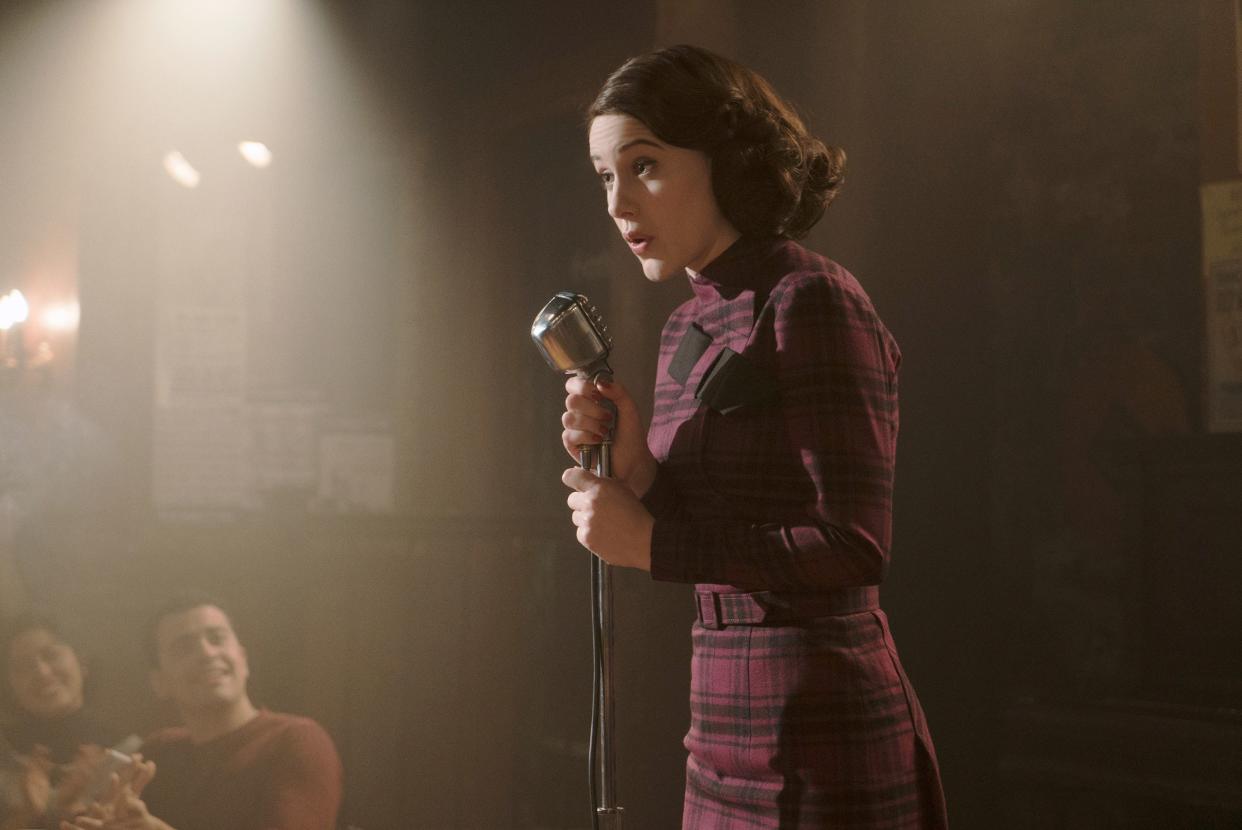'The Marvelous Mrs. Maisel': More goodness from 'Gilmore Girls' creator

The Marvelous Mrs. Maisel — the new show from Gilmore Girls producers Amy Sherman-Palladino and her husband, Dan Palladino — is almost ridiculously entertaining. Set in late-1950s New York City, it’s about an upper-class young woman who discovers she doesn’t want the roles of wife and mother dictated by her era. Instead, she gets involved in the standup comedy scene in bohemian Greenwich Village. Like Gilmore Girls and Sherman-Palladino’s other excellent show, Bunheads, Mrs. Maisel is about dreams and ambition and hope and doubt and struggle, all of it as experienced by women who can really turn a phrase.
In the new show, Miriam “Midge” Maisel (House of Cards’ Rachel Brosnahan) is the daughter of a fussy, smug academic, played by Tony Shalhoub. She marries Joel (Michael Zegen), the son of of a pushy dress manufacturer played with a derisive edge by Kevin Pollak. (The two fathers rub each other the wrong way, delightfully.) Midge and Joel have two children, but Joel is a restless guy — he thinks he wants to be a comedian, and he has an affair with the sort of attractive but nothing girl that Cosmopolitan editor Helen Gurley Brown (a celebrity in Midge’s time) used to call a mouse-burger. When Joel leaves her after his infidelity is revealed, Midge, definitely no mouse-burger, says the worst thing a Sherman-Palladino character can tell someone: He’s got no natural sense of humor.
Joel may be a lousy comedian, but, having tagged along with him to the smoky clubs, Midge realizes she understands the shapes of jokes and the rhythm of delivering them onstage. After one night onstage — getting drunk and being angry can give you that kind of courage — she’s hooked. Hubby slinks back to his dull office job, and Midge starts spending her nights crafting a comedy act, depositing her children with some combination of the maid and her mother (a terrifically tart Marin Hinkle). In interviews, Sherman-Palladino has revealed that her own father was a pretty good comedian himself, though he never hit the big time, and she drew upon childhood memories of comics kidding and kibitzing around her house. Mrs. Maisel is Sherman-Palladino’s first period piece, and that was a great decision for a number of reasons. First, this show has atmosphere up the wazoo: snazzy clothes and a glimpse of New York City glamor whenever Midge is at home. (What is the budget for this show? The apartment set alone looks like it must have cost millions.)
Second, setting the show in the late-’50s gives the creators a chance to mine the real-life experiences of a few female comedians on the rise during this period. Midge has a bit of the early Joan Rivers’ edge, a smidgen of Totie Fields’ brassy attack, and a whole lot of Jean Carroll’s classy-but-cutting style. (I really wish there was more video of Carroll out there — other than a few appearances on The Ed Sullivan Show and a couple of other period variety shows, there’s precious little of this unique artist’s work available.) But here’s the best thing Sherman-Palladino has done: She hasn’t made Midge a clone of any of these women, each of whom prized the honed and sharpened joke as her primary weapon. Instead, the stuff Midge says onstage is more conversational — Mort Sahl without the politics or the cashmere sweaters; Shelley Berman without the mimed telephone schtick. “Observational humor” this would come to be called a decade later, when first Bill Cosby and then Jerry Seinfeld struck TV-gold with the style.
When Midge grabs the big, clunky microphone and pulls it close to her like a woozy debutante grabbing hold of her date for the night, she murmurs confidingly — the audience leans in and laughs. It is absolutely crucial to the artistic success of Marvelous Mrs. Maisel that Sherman-Palladino has defeated the greatest challenge in making a comedy TV-show about standup comedy: how to amuse viewers as much as the audience within the show. (This is the obstacle that was never overcome by Showtime’s I’m Dying Up Here, which just lays on the TV screen stinking like a dead fish.) Midge succeeds, however, with her marvelous monologues, as delivered so cleverly and daringly by Brosnahan. Midge gets vulgar enough to be arrested, in the first episode, for onstage obscenity, and darned if Lenny Bruce himself — as played by Luke Kirby — isn’t around, chain-smoking in a ratty tan raincoat, to give her pointers about both timing and how to survive a night in the pokey.
Amazon Prime is lucky to have signed Sherman-Palladino and to have ponied up for a two-season commitment for The Marvelous Mrs. Maisel, because it’s obvious from the four episodes I’ve watched that Brosnahan is giving a superb performance and that Amy Sherman-Palladino knows exactly where she’s going with the stories she and Dan want to tell. I know some of you are going to say, “Aw, gee — does this mean no more new Gilmore Girls on Netflix?” To which I respond: Hold your horses. Gilmore Girls can wait — wait for Mrs. Maisel to burrow its own distinctive blend of comedy, drama, and romance into your heart and mind.
The Marvelous Mrs. Maisel is streaming on Amazon Prime.
Read more from Yahoo Entertainment:
‘Avengers: Infinity War’ trailer assembles the Marvel Universe
Celebrities respond to Matt Lauer’s firing
Bruno Mars on the most nerve-racking moment of his new Apollo special

